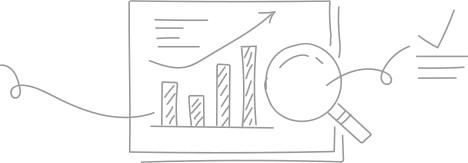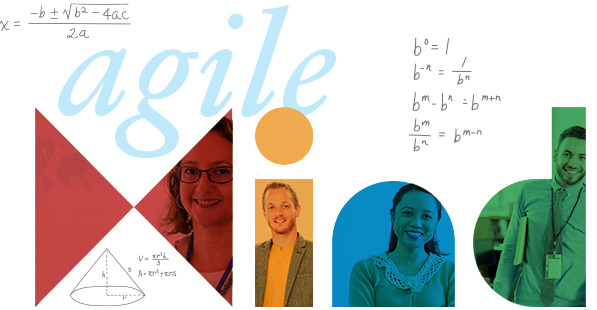INTENSIFICATION ENHANCES ACHIEVEMENT
Large-scale effort in Washington state produces large-scale gains for high school math students
Over the past 6 years, as part of a College-Ready Math Initiative designed to prepare students to transition into college level math without the need for remediation or other placement courses, almost 12,000 students and 300 teachers in 53 schools across 36 districts in Washington State have participated in Intensified Algebra I or Academic Youth Development. The programs are created by Agile Mind and The Charles A. Dana Center at The University of Texas at Austin and Agile Mind.
The effort is funded and otherwise supported by College Spark Washington and the Washington State Office of Superintendent of Public Instruction (OSPI) and is particularly intended to remove barriers for low-income students and students of color. College Spark and Washington OSPI have worked each year with independent evaluators at the BERC Group to assess the impact of both Academic Youth Development and Intensified Algebra I.
Here are the most recent highlights of their findings, as to Intensified Algebra, an intervention program for students who come to Algebra I 2-3 years behind. This daily math program develops students’ academic skills and knowledge through engaging learning grade-level experiences–rather than embodying the more typical remedial design. Central to the design is the idea that struggling students need a powerful combination of a challenging curriculum; cohesive, targeted supports for both their capacity with math content and their social, emotional, and academic development; and additional well-structured class time. Learn more about Intensified Algebra I.
In this brief video, Dr. Lindsay O’Neal Lombardo, Director of Secondary Curriculum in Sumner-Bonney Lake School District, talks about the benefits of IA for students and teachers.
Positive Outcomes in Math Achievement and Learning Culture
According to the BERC Group evaluators, student participation in Intensified Algebra I has resulted in stronger academic outcomes than those for similar students in matched comparison schools: “In all cohort groups over the 6 years of the initiative, IA students had significantly higher grades than comparison Algebra I students.” Also, in 4 of the 6 cohorts, participation in IA alone was predictive of higher scores on the Smarter Balanced Assessment (SBA) in 10th grade.
According to the independent evaluators, “These patterns, along with evidence from the qualitative data, suggest that the students are responding positively to the unique curriculum, professional development, and pedagogy of IA courses. Membership in IA shows better outcomes for students.”
In addition to the associated gains in achievement, evaluators and participating educators describe the IA classroom as more collaborative, welcoming, and supportive. With IA, students are given more time to ease into the new expectations and pressures of high school. Teachers use the curriculum to engage students at the beginning of the year in learning about growth mindset, which supports their transition from middle school to 9th grade. This pays off in results: The independent report notes, “Teachers and administrators continued to notice increased math confidence leading to greater engagement, academic discourse, and willingness to take [academic] risks and try new things.” To learn more about the details of the evaluation findings, view the College Readiness Math Initiative report.
A teacher and leader from Bethel School District share their perspectives.
Comprehensive Support, Before and Through COVID
Participating educators report that the support of Agile Mind’s Professional Learning team is a highlight of the initiative and key to IA teachers’ success and growth, particularly during COVID. IA teachers and administrators note that the IA curriculum and Agile Mind professional learning supports increased teacher efficacy and impacted school and classroom culture. Through the initiative, IA teachers have become leaders in their schools, sharing mindset work, engagement strategies, and discourse practices from IA with other teachers, which leaders say has strengthened their overall math departments.
During the 2019-2020 year, participating schools faced unprecedented challenges related to the COVID 19 pandemic. Like many districts, those in the initiative focused early efforts on how to provide safe, equitable access to instruction. With a comprehensive professional learning model that includes a variety of supports, schools were able to provide IA students with a modified curriculum to address challenges related to student engagement, assessment, and access. According to evaluators, Agile Mind’s ongoing support played a key role in advancing the effectiveness of distance learning efforts in participating schools, with guidance on adapting IA materials during COVID and regular virtual collaboration that included modeling, coaching, and co-teaching opportunities. In interviews, numerous teachers noted that they saw stronger, more consistent attendance in distance learning from their IA students than among students in their regular math courses.
According to the independent report, “Several teachers commented on the level of support they received during COVID school closures, sharing that the “availability and responsiveness,” “empathy and understanding,” and “wealth of knowledge” were critical to their ability to implement components of IA during the disruption.
Collaboration between IA teachers was another consistent strength through this work. During the transition to online learning, but also throughout the year, teachers made time to talk with one another regularly. Some schools provided structured collaboration time, but many teachers shared that they met with their IA peers on their own time to plan and debrief their work with students. Through disruptions, schools worked with Agile Mind Advisors to develop a model that fit the needs of their community.
The independent evaluators note, “The flexibility and knowledge of the trainers, which has been a highlight of this initiative over several years, became more evident during this disruption. The professional development for IA teachers continued at a robust pace during the pandemic and provided multiple ways for teachers to engage in new learning and problem solving.”
Leaders and teachers describe the support from Agile Mind, and how Intensified Algebra I supported district goals for distance learning and for equity.





